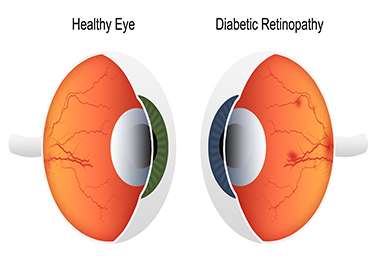
Diabetic Retinopathy occurs when high blood sugar levels cause damage to the blood vessels inside the retina. The blood vessels can swell, leak, or they can close which can stop blood from passing through. Sometimes new, abnormal blood vessels can grow on the retina. All of which can decrease your vision.
There are two stages of Diabetic Retinopathy. The early stage, is known as NPDR (non-proliferative diabetic retinopathy). Many people with diabetes have this stage of the disease. With NPDR, the blood vessels leak causing the retina to swell. When the macula swells, it is called macular edema and this is the most common reason that people with diabetes lose their vision. Blood vessels can also close, which is called a macular ischemia, and blood cannot reach the macula. The more advanced stage of Diabetic Retinopathy is known as PDR (proliferative diabetic retinopathy). In the PDR stage of Diabetic Retinopathy, the retina begins growing new blood vessels, and this is called neovascularization. The new blood vessels often bleed into the vitreous. A small amount of blood may cause a few dark floaters, but a lot of bleeding can completely block your vision.
Treatment options for Diabetic Retinopathy include controlling your blood sugar and your blood pressure, certain medications that help to reduce swelling in the macula, laser surgery that can be used to seal off leaking blood vessels or to shrink blood vessels to prevent them from growing again, or possibly a procedure known as a vitrectomy where an ophthalmologist will remove the vitreous gel and blood from leaking vessels in the back of the eye. There are now injections to reduce the swelling and/or bleeding available from retinal specialists.
I was very fortunate to have Dr. Haggerty as my doctor. He found a problem with my eyes that a previous doctor had missed, that could have led to blindness. He fixed the problem painlessly and now my eyes are great. He also did an eyelift for me and I can see so much better than before. For me they are the best!!